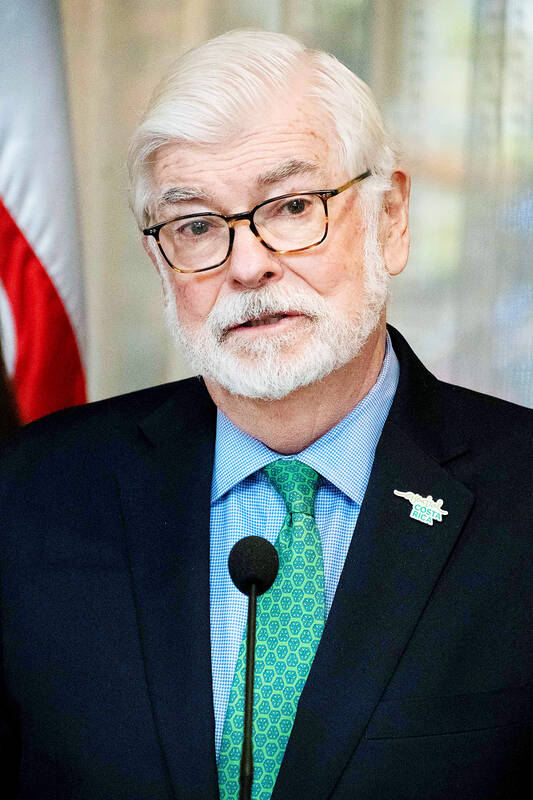A senior envoy of US President Joe Biden is to travel to Honduras and Panama this month, the US Department of State said on Thursday, two days after Honduras said it would establish formal diplomatic ties with Beijing, stoking concern that it might cut ties with Taipei.
US Special Presidential Adviser for the Americas Chris Dodd would visit the two Central American countries from yesterday to Tuesday, the department said in a statement.
The US has in the past few years focused on migration and security challenges stemming from Central America, as well as trade and development priorities, but it has also been concerned about Chinese efforts to expand its influence in the region.

Photo: AFP
Dodd, a former US senator, is to meet Honduran officials and private-sector representatives, and Panamanian officials and finance leaders, as well as attend an annual conference of the Inter-American Development Bank.
“These visits advance the commitment of the United States to foster inclusive economic growth, democracy, human rights and rule of law in the western hemisphere,” the department said.
Dodd in 2021 led a delegation to visit Taiwan on behalf of Biden, with whom he has a close relationship.
On Tuesday, Honduran President Xiomara Castro wrote on Twitter that her administration would seek diplomatic ties with Beijing, which would come at the expense of Taiwan.
Honduran Minister of Foreign Affairs Eduardo Enrique Reina on Wednesday said that the pivot to China was partly because Honduras was “up to its neck” in financial challenges and debt, including US$600 million it owes Taiwan.
Speaking to reporters in Taipei yesterday, Premier Chen Chien-jen (陳建仁) reiterated a warning to Honduras not to trust China and its monetary offers.
“China has been suppressing Taiwan’s diplomacy, so it will invest funds related to specific countries in order to block Taiwan’s diplomatic development,” he said.
Chinese investment as part of its Belt and Road Initiative in these countries had mostly failed, Chen said.
“Therefore, we very much hope that Honduras can recognize the true nature of China, and hope they maintain diplomatic relations and not be deceived,” he added.
The Ministry of Foreign Affairs is still “working hard” regarding the ties with Honduras, Minister of Foreign Affairs Joseph Wu (吳釗燮) told a legislative hearing yesterday.
The nation has never given up on anything for being too difficult, he said, but added that “we will not engage in bidding-war diplomacy with China.”
China on Thursday denied that former Taiwan allies, such as Panama and El Salvador, had not benefited since forging relations with Beijing, saying they had received “tangible benefits.”
Taiwan has 13 UN-recognized diplomatic allies, including Honduras, as well as Somaliland.
Asked about the Honduras-Taiwan ties, US Secretary of State Antony Blinken said that Taiwan has a “lot to offer.”
“Taiwan has a lot to offer, including ... in international institutions, where remarkably talented people have tremendous experience and expertise,” he said. “Countries have to decide for themselves whether and how they want to benefit from that.”
Additional reporting by Wu Su-wei and Su Yung-yao

Conflict with Taiwan could leave China with “massive economic disruption, catastrophic military losses, significant social unrest, and devastating sanctions,” a US think tank said in a report released on Monday. The German Marshall Fund released a report titled If China Attacks Taiwan: The Consequences for China of “Minor Conflict” and “Major War” Scenarios. The report details the “massive” economic, military, social and international costs to China in the event of a minor conflict or major war with Taiwan, estimating that the Chinese People’s Liberation Army (PLA) could sustain losses of more than half of its active-duty ground forces, including 100,000 troops. Understanding Chinese

The Ministry of Foreign Affairs (MOFA) yesterday said it is closely monitoring developments in Venezuela, and would continue to cooperate with democratic allies and work together for regional and global security, stability, and prosperity. The remarks came after the US on Saturday launched a series of airstrikes in Venezuela and kidnapped Venezuelan President Nicolas Maduro, who was later flown to New York along with his wife. The pair face US charges related to drug trafficking and alleged cooperation with gangs designated as terrorist organizations. Maduro has denied the allegations. The ministry said that it is closely monitoring the political and economic situation

UNRELENTING: China attempted cyberattacks on Taiwan’s critical infrastructure 2.63 million times per day last year, up from 1.23 million in 2023, the NSB said China’s cyberarmy has long engaged in cyberattacks against Taiwan’s critical infrastructure, employing diverse and evolving tactics, the National Security Bureau (NSB) said yesterday, adding that cyberattacks on critical energy infrastructure last year increased 10-fold compared with the previous year. The NSB yesterday released a report titled Analysis on China’s Cyber Threats to Taiwan’s Critical Infrastructure in 2025, outlining the number of cyberattacks, major tactics and hacker groups. Taiwan’s national intelligence community identified a large number of cybersecurity incidents last year, the bureau said in a statement. China’s cyberarmy last year launched an average of 2.63 million intrusion attempts per day targeting Taiwan’s critical

‘SLICING METHOD’: In the event of a blockade, the China Coast Guard would intercept Taiwanese ships while its navy would seek to deter foreign intervention China’s military drills around Taiwan this week signaled potential strategies to cut the nation off from energy supplies and foreign military assistance, a US think tank report said. The Chinese People’s Liberation Army (PLA) conducted what it called “Justice Mission 2025” exercises from Monday to Tuesday in five maritime zones and airspace around Taiwan, calling them a warning to “Taiwanese independence” forces. In a report released on Wednesday, the Institute for the Study of War said the exercises effectively simulated blocking shipping routes to major port cities, including Kaohsiung, Keelung and Hualien. Taiwan would be highly vulnerable under such a blockade, because it